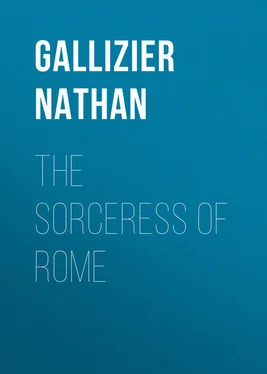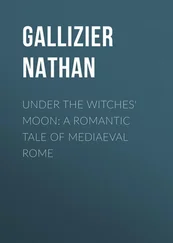Nathan Gallizier - The Sorceress of Rome
Здесь есть возможность читать онлайн «Nathan Gallizier - The Sorceress of Rome» — ознакомительный отрывок электронной книги совершенно бесплатно, а после прочтения отрывка купить полную версию. В некоторых случаях можно слушать аудио, скачать через торрент в формате fb2 и присутствует краткое содержание. Жанр: foreign_antique, foreign_prose, на английском языке. Описание произведения, (предисловие) а так же отзывы посетителей доступны на портале библиотеки ЛибКат.
- Название:The Sorceress of Rome
- Автор:
- Жанр:
- Год:неизвестен
- ISBN:нет данных
- Рейтинг книги:4 / 5. Голосов: 1
-
Избранное:Добавить в избранное
- Отзывы:
-
Ваша оценка:
- 80
- 1
- 2
- 3
- 4
- 5
The Sorceress of Rome: краткое содержание, описание и аннотация
Предлагаем к чтению аннотацию, описание, краткое содержание или предисловие (зависит от того, что написал сам автор книги «The Sorceress of Rome»). Если вы не нашли необходимую информацию о книге — напишите в комментариях, мы постараемся отыскать её.
The Sorceress of Rome — читать онлайн ознакомительный отрывок
Ниже представлен текст книги, разбитый по страницам. Система сохранения места последней прочитанной страницы, позволяет с удобством читать онлайн бесплатно книгу «The Sorceress of Rome», без необходимости каждый раз заново искать на чём Вы остановились. Поставьте закладку, и сможете в любой момент перейти на страницу, на которой закончили чтение.
Интервал:
Закладка:
"Such is my choice," replied Eckhardt. "And now your blessing and intercession, father. Let the time of my novitiate be brief!"
"I will do what I can," replied the monk, then he added slowly and solemnly:
"Christ accepts your obedience and service! I purge you of your sins in the name of the Trinity and the Mother of God, into whose holy keeping I now commit you! Go in peace!"
"I go!" muttered the Margrave, rising exhausted from his long agony and staggering down the dark aisles of the church.
Eckhardt's footsteps had no sooner died away in the gloom of the high-vaulted arches, than two shadows emerged from behind a pillar and moved noiselessly down towards the refectory.
In the dim circle of light emanating from the tapers round the altar, they faced each other a moment.
"What ails the Teuton?" muttered the Grand Chamberlain, peering into the muffled countenance of the pseudo-confessor.
"He upbraids the fiend for cheating him of the smile of a corpse," the monk Cyprianus replied with strangely jarring voice.
"And yet you fear I will lose my wager?" sneered the Chamberlain.
The monk shrugged his shoulders.
"They have a proverb in Ferrara: 'He who may not eat a peach, may not smell at it.'"
"And you were not revealed to him, you, for whom he has scoured the very slime of the Tiber?" Benilo queried, ignoring the monk's facetiousness.
"'Tis sad to think, what changes time has wrought," replied the latter with downcast eyes. "Truly it behooves us to think of the end, – the end of time!"
And without another word the monk passed down the aisles and his tall form was swallowed in the gloom of the Church of the Hermits.
"The end!" Benilo muttered to himself as he thoughtfully gazed after the monk. "Croak thou thine own doom, Cyprianus! One soul weighs as much as another in the devil's balance!"
With these words Benilo passed through the portals of the church and was soon lost to sight among the ruins of the Aventine.
CHAPTER VIII
CASTEL SAN ANGELO
Night had spread her pinions over the ancient capital of the Cæsars and deepest silence had succeeded the thousand cries and noises of the day. Few belated strollers still lingered in the deserted squares. Under the shadows of the Borgo Vecchio slow moving figures could be seen flitting noiselessly as phantoms through the marble ruins of antiquity, pausing for a moment under the high unlighted arches, talking in undertones and vanishing in the night, while the remote swell of monkish chants, monotonous and droning, died on the evanescent breezes.
Round Castel San Angelo, rising, a giant Mausoleum, vast and sombre out of the solitudes of the Flaminian Way, night wove a more poetic air of mystery and quiet, and but for the tread of the ever wakeful sentinels on its ramparts, the colossal tomb of the emperor Hadrian would have appeared a deserted Memento Mori of Imperial Rome, the possession of which no one cared to dispute with the shades of the Cæsars or the ghosts of the mangled victims, which haunted the intricate labyrinth of its subterranean chambers and vaults.
A pale moon was rising behind the hills of Albano, whose ghostly rays cast an unsteady glow over the undulating expanse of the Roman Campagna, and wove a pale silver mounting round the crest of the imperial tomb, whose towering masses seemed to stretch interminably into the night, as if oppressed with their own memories.
What a monstrous melodrama was contained in yonder circular walls! They wore a comparatively smiling look only in the days when Castel San Angelo received the dead. Then according to the historian Procopius, the immense three-storied rotunda, surmounted by a pyramidal roof had its sides covered with Parian marble, intersected with columns and surmounted with a ring of Grecian statues. The first story was a quadrangular basement, decorated with festoons and tablets of funeral inscriptions, colossal equestrian groups in gilt bronze at the four corners.
Within the memory of living generation, this pile had been the theatre of a tragedy, almost unparalleled in the annals of Rome, the scene of the wildest Saturnalia, that ever stained the history of mediæval state. An incongruous relic of antique profligacy and the monstrosities of the lower empire, drawing its fatal power from feudal institutions, Theodora, a woman illustrious for her beauty and rank, had at the dawn of the century quartered herself in Castel San Angelo. From there she exercised over Rome a complete tyranny, sustained against German influence by an Italian party, which counted amongst its chiefs Adalbert, Count of Tuscany, the father of this second Messalina. Her fateful beauty ruled Church and state. Theodora caused one pontiff after another to be deposed and nominated eight popes successively. She had a daughter as beautiful and as powerful as herself and still more depraved. Marozia, as she was called, reigned supreme in Castel San Angelo and caused the election of Sergius III, Anastasius III and John X, the latter a creature of Theodora, who had him appointed to the bishopric of Ravenna. Intending to deprive Theodora and her lover, the Pope, of the dominion of Rome, Marozia invaded the Lateran with a band of ruffians, put to the sword the brother of the Pope, and incarcerated the pontiff, who died in prison either by poison or otherwise. Tradition relates that his corpse was placed in Theodora's bed, and superstition believes that he was strangled by the devil as a punishment for his sins.
Left as widow by the premature death of the Count of Tusculum and married to Guido, Prince of Tuscany, Marozia, after the demise of her second husband, was united by a third marriage to Hugo of Provence, brother of Guido. Successively she placed on the pontifical throne Leo VI and Stephen VIII, then she gave the tiara to John XI, her younger son. One of her numerous offspring imprisoned in the same dungeon both his mother and his brother, the Pope, and then destroyed them. Rumour hath it, however, that a remote descendant, who had inherited Marozia's fatal beauty, had been mysteriously abducted at an early age and concealed in a convent, to save her from the contamination and licentiousness, which ran riot in the blood of the women of her house. She had been heard of no more and forgotten long ago.
After the changes and vicissitudes of half a century the family of the Crescentii had taken possession of Castel San Angelo, keeping their state in the almost impregnable stronghold, without which the possession of Rome availed but little to any conqueror. It was a period marked by brutal passions and feudal anarchy. The Romans had degenerated to the low estate of the barbarian hordes, which had during the great upheaval extinguished the light of the Western empire. The Crescentii traced their origin even to that Theodora of evil fame, who had perished in the dungeons of the formidable keep, and Johannes Crescentius, the present Senator and Patricius, seemed wrapt in dark ruminations, as from the window of a chamber in the third gallery he looked out into the night, gazing upon the eddying Tiber below, bordered by dreary huts, thinly interspersed with ilex, and the barren wastes, from which rose massive watch-towers. Far away to Southward sloped the Alban hills. From the dark waving greens of Monte Pincio the eye, wandering along the ridge of the Quirinal, reached to the mammoth arches of Constantine's Basilica, to the cypress bluffs of Aventine. Almost black they looked at the base, so deep was their shade, contrasted with the spectral moon-light, which flooded their eminences.
The chamber in which the Senator of Rome paced to and fro, was large and exceedingly gloomy, being lighted only by a single taper which threw all objects it did not touch into deep shadow. This fiery illumination, casting its uncertain glimmer upon the face of Crescentius, revealed thereon an expression of deepest gloom and melancholy and his thoughts seemed to roam far away.
Читать дальшеИнтервал:
Закладка:
Похожие книги на «The Sorceress of Rome»
Представляем Вашему вниманию похожие книги на «The Sorceress of Rome» списком для выбора. Мы отобрали схожую по названию и смыслу литературу в надежде предоставить читателям больше вариантов отыскать новые, интересные, ещё непрочитанные произведения.
Обсуждение, отзывы о книге «The Sorceress of Rome» и просто собственные мнения читателей. Оставьте ваши комментарии, напишите, что Вы думаете о произведении, его смысле или главных героях. Укажите что конкретно понравилось, а что нет, и почему Вы так считаете.












